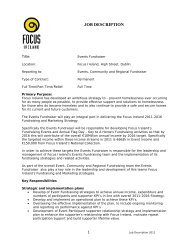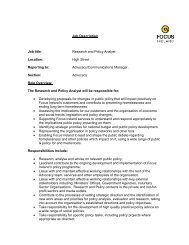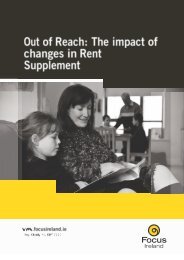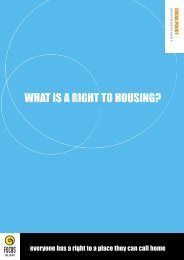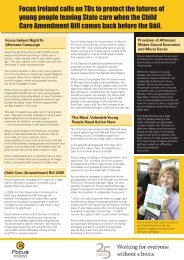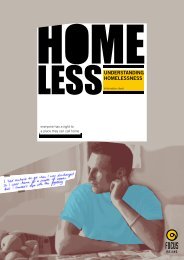Download No Place Like Home resource here - Focus Ireland
Download No Place Like Home resource here - Focus Ireland
Download No Place Like Home resource here - Focus Ireland
- No tags were found...
Create successful ePaper yourself
Turn your PDF publications into a flip-book with our unique Google optimized e-Paper software.
Aonad 1Cárta Oibre 6AAinm<strong>Home</strong>lessness in <strong>Ireland</strong> – Past, Present and FutureArticle 1Read each of the following articles and decide with your group whether itrelates to homelessness in <strong>Ireland</strong> in the past, present or future.Housing in <strong>Ireland</strong> has undergone manychanges in recent years, which has had adirect effect on the numbers of peoplewho are out of home <strong>here</strong>. In the past,only a small percentage of thepopulation owned their own houses,while today 81% of the population doso. In recent years, house prices haverisen dramatically for a number ofreasons. The country experienced aneconomic boom in recent years but t<strong>here</strong>was also a shortage of people to fill themany jobs that were created by thisboom. As a result, the Irish governmentbegan inviting people from othercountries to work <strong>here</strong>, many of whomwere returning Irish emigrants. In fact,from 2002-2004, 61,400 Irish emigrantsreturned to live in <strong>Ireland</strong>. The increasein population led to a huge demand formore housing and this was one of t<strong>here</strong>asons for the increase in house prices.Unfortunately, not everyone has enjoyedthe fruits of this economic boom.Higher house prices mean that peopleare charged more to rent homes and noteveryone can afford to pay such highrental rates. Problems with affordablehousing means that people have noalternative but to go on a waiting list forsocial housing *. Between 1999 and2002, the number of households in needof social housing had risen by 23.5%.T<strong>here</strong> are now approximately 43,684people in <strong>Ireland</strong> on Local Authoritywaiting lists.*Social housing includes:• Local Authority (Council) houseswhich are built or bought by the localcity or county council and rented at lowprices to families on a low income.• Voluntary houses which are built byvoluntary organisations that providehousing for the elderly, the disabled,those who are out of home, etc.[Sources: Central Statistics Office,Irish Council for Social Housing]Article 3Article 2<strong>Ireland</strong> acquired its first poor law in 1838 with theintroduction of the Irish Poor Law Act. It was a very importantmilestone in <strong>Ireland</strong>’s history because it was our first socialservice system, and touched the lives of the poorest and mostvulnerable people in the country. Taxes were levied onlandowners (who rented out houses to farmers) in order tocover the cost of building over 130 workhouses throughout<strong>Ireland</strong>.Many of the landlords didn’t want to pay these taxes and as aresult, many families were evicted from their homes and forcedto go and live in workhouses. With the onset of The GreatFamine in 1845, many more small farmers were evictedbecause they couldn’t afford to pay their rent.The workhouses became hugely overcrowded and mostfamilies were split up once inside. Conditions in theworkhouses were appalling with food of very poor quality andthe rapid spread of disease. For many people, the only way toavoid the horrors of the workhouses was to emigrate. In total,1.2 million people emigrated to England, USA and Australia.It has been estimated that by2031, the over-65’s may accountfor almost 22% of the totalpopulation. Many of these elderlymembers of society may needhousing support when they are nolonger able to work. With housingprices continually on the increase itis probable that social housingwaiting lists will continue to grow.The expansion of the EU will meanthat more immigrants will come towork in <strong>Ireland</strong> to meet theworkforce needs and will requireaffordable housing while they arewaiting to get settled andestablished <strong>here</strong>.T<strong>here</strong> is clearly a need to increasethe number of Local Authority andvoluntary houses being built in<strong>Ireland</strong>. It is also essential thatimmigrant workers are paid thesame salaries as those of Irishnationals to ensure that they canafford the rising cost of living in thiscountry.[Source: The Immigrant Council of <strong>Ireland</strong>]68



